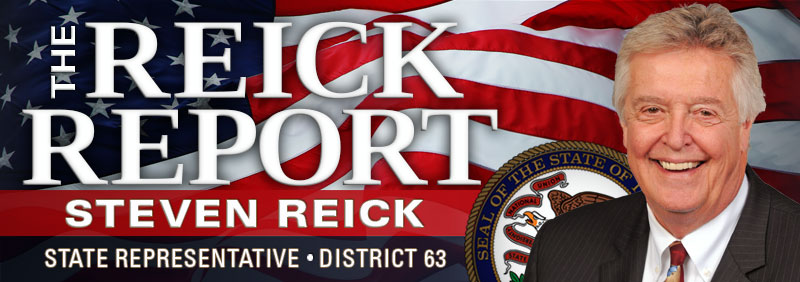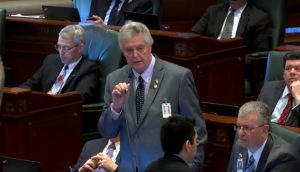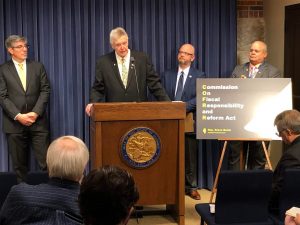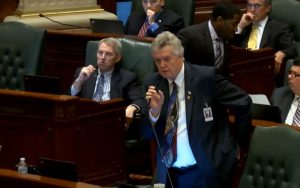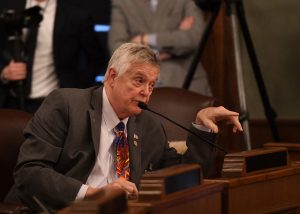Reick Joins Republicans in Opposing Madigan’s House Rules
House Republicans believe we must break the Speaker’s stranglehold on power and instead, give power back to the people of Illinois and their duly elected representatives. We offered the following reasonable Rules reforms as part of House Resolution 62:
1. Require Committee Vote for Bipartisan Bills & Resolutions Pending in Committee – Require that when a bill or resolution in committee has at least five co-sponsors from the majority caucus and at least five co-sponsors from the minority caucus, the Committee Chairperson must provide an opportunity to the bill sponsor to present the bill for consideration and a committee vote.
2. Create Waiting Period for Floor Amendments – Create a longer public review period before consideration of floor amendments and concurrence motions by prohibiting consideration until the calendar day after notice is posted for a hearing or the calendar day after the measure is reported directly to the House from the Rules Committee.
3. Create Waiting Period After Committee Testimony – Require that the initial testimony and discussion of bills in committee must occur before a vote of the committee on the reporting motion; and such committee vote may not occur on the same calendar day that testimony was heard.
4. Require House Vote for Bills & Resolutions Supported by Bipartisan Supermajority – Provide that a motion signed by 71 members guarantees a vote of the House on a bill or resolution. At least five members affiliated with the majority party and five members affiliated with the minority party must be included among the 71 or more signatories. Such bills would be discharged from a standing/special/Rules committee, or transferred from the regular calendar, and placed on an order of business that the House must go to each day that it convenes in regular session; and sponsors of bills on the order would have the right to call their bills for a vote whenever the House is on that order.
5. Extend Time for the House to Consider Motions to Discharge Standing/Special Committee – Provide that for six session days after the committee reporting deadline the House may still consider motions to discharge from standing or special committees. Currently, bills remaining in committee on date of the reporting deadline are immediately re-referred to the Rules Committee, which means that the motion to discharge from standing committee, which requires 60 votes for adoption, is no longer an option.
These reforms would foster an environment of individual legislator empowerment, regardless of partisan affiliation. Unfortunately, Speaker Madigan did not allow a vote on HR 62.
Reick Pushes for Private Sector Examination of State Agency Spending
HJR06 and HB275 are modeled after President Ronald Reagan’s 1982 executive order calling for a private sector study on cost control, which resulted in the 1984 ‘Grace Commission’ report. That audit led to 2,487 separate recommendations for streamlining government agencies in ways that would have saved hundreds of billions. By identifying inefficiencies, redundancies and insufficient control over the operations of state agencies which result in inadequate services being provided at too high a cost, we can make adjustments and provide taxpayers with the value they deserve.
Specifically, HJR06 provides the legislative intent for the establishment of the Commission and points to the State’s obligation to provide public services necessary to ensure that Illinoisans can live in dignity and safety. HB275 creates the Commission on Fiscal Responsibility and Reform Act. The panel would consist of 18 voting members, including three members each appointed by the House Speaker, House Minority Leader, Senate President and Senate Minority Leader, and six members appointed by the Governor with not more than four members from the same political party. Like the Grace Commission, this Commission would be privately funded by soliciting contributions to be made to a 501(c)(4) social welfare organization as Commission members would not be paid, and results would be presented to the Governor and the General Assembly by October 1, 2020.
January 2019 Revenue Numbers Released
The new numbers from the Commission on Government Forecasting and Accountability (CGFA), the nonpartisan budget-monitoring arm of the General Assembly, show a continued trend of slightly increased State revenue related to recurring year-earlier cash flow trends. Revenues for January 2019 failed to match the spiked revenues of January 2018, which were one-time-only numbers that reflected the passage of the federal Tax Cuts and Jobs Act (TCJA) in December 2017.
The first seven months of FY19 showed continued State of Illinois cash flow progress, reflecting strong economic numbers in the Chicago metro area. Personal income tax payments and sales tax receipts closely track the numbers of workers employed in Illinois and related consumer spending. During the seven months of FY19 year-to-date, total State income from taxes is up $1,154 million from the year-earlier seven-month period. This increase is associated with healthier personal income tax payments (up $537 million), sales tax remittals (up $374 million) and corporate income taxes (up $174 million). The $1,085 million in net increased cash flows garnered from these three sources made up well more than 90 percent of the overall year-over-year increase of $1,154 million in State tax cash flow.
The increase in cash flowing into the State Treasury is not nearly sufficient to close Illinois’ “structural deficit.” Illinois taxpayers continue to struggle with the burden of exponential increases in health care costs, billions of dollars in unpaid bills, and more than $100 billion in unfunded defined-benefit pension liabilities.
Rep. Reick Files Bills to Address Pension and Failure to Report Loopholes in Instances of Student Sexual Abuse
HB 277 closes a loophole in the Abused and Neglected Child Reporting Act that was allowing some school employees to keep their jobs after failing to report suspected abuse of a student. Teachers and other school employees are mandatory reporters when abuse is suspected, but our current laws only provide for the dismissal of those who willfully make a choice not to report suspected abuse in schools. My legislation expands the ability to remove an employee to also include those displaying negligence. Whether the failure to report is willful or not, it is inexcusable and school boards need tools at their disposal to dismiss those who fail to fulfill their duties as mandatory reporters. We can’t let child predators off the hook due to a technicality.
Both bills have Democrat Chief Co-Sponsorship by State Representative Jonathan Carroll (D-Northbrook). HB 276 has been assigned to the House Personnel & Pensions Committee and HB 277 has been assigned to the Elementary & Secondary Education: Administration, Licensing and Charter School Committee.
Rep. Reick Partners with McHenry County State’s Attorney to Address Negative Fallout from Bail Reform Act
Like many laws that take effect in Springfield, it is only after they are implemented that we see some of the unintended consequences. We are finding that there is no ‘one-size-fits-all’ solution to pre-trial justice reform. Provisions of the Bail Reform Act that took effect in 2018 may be having success in Cook County, but they are not working well here in McHenry County. My HB 221 would allow any county with a population of less than 3,000,000 to exempt themselves from the provisions of the Bail Reform Act if the county board adopts a resolution for that purpose.
Illinois’ Bail Reform Act was part of a national movement to improve the pre-trial justice system in the country. Among other things, it requires judges to consider a detainee’s circumstances when setting conditions of release or imposing monetary bail. The result has been a larger number of individuals released with no monetary bail requirement. The new Act also provides detainees awaiting court dates with credit toward an early release for each day spent in jail. Regionally, a large spike in “failure to appear in court” cases has occurred since the Act took effect, and in McHenry County, four deaths have been reported involving opioid or other controlled or illegal substance abusers who were released early through the provisions of the Act.
State’s Attorney Patrick Kenneally pointed to a reduced ability for his office to fight the opioid epidemic as another unintended consequence of the Bail Reform Act. He said the new law is putting opioid abusers back onto the streets after they have detoxed in jail for several days but before they have been provided with access to proper services to help them address their issues with drug abuse. As a result, they return to the streets, continue using drugs, and in four cases have overdosed and died. HB 221 has been assigned to the Judicial-Criminal Committee.
Illinois Responds to Record-Breaking Cold Temperatures
Representative Reick Tapped for Service on Influential Revenue & Finance Committee
Just as I did when minimum wage bills came before this committee in the 100th General Assembly, I have significant concerns about unemployment numbers and how an increase in the minimum wage may negatively affect a great number of Illinoisans. If our goal is to put more people onto a ladder toward economic prosperity, moving that initial rung of the ladder further out of reach might cause more harm than people realize. It’s an important conversation we will need to have.
My other committee assignments for the 101st General Assembly include the Consumer Protection, Elementary & Secondary Education: Curriculum & Policies, and Personnel & Pensions Committees.
Illinois’ Tax Burden Ranked 11th of 50 States
The ranking came from the nonpartisan Tax Foundation, which found that residents of 38 of the 50 states are expected to enjoy lower state and local per-capita tax burdens than residents of Illinois in calendar year 2019. According to the Tax Foundation, states with lower average per-capita state and local tax burdens than Illinois include the neighboring states of Indiana, Iowa, Kentucky, Missouri, and Wisconsin, and the large states of Florida, Georgia, Michigan, Ohio, Pennsylvania, and Texas. States with a higher average per-capita state and local tax burden than Illinois include high-tax California and New York.
The Tax Foundation expects the average Illinoisan to have to pay $5,654 in state and local taxes in calendar year 2019. This leaves out taxes paid to the federal government, as well as payments to governments not classified as taxes (such as fees, fines, and pubic-sector charges). This number is for each individual Illinois resident, and can be multiplied for a picture of the burden upon families and multi-member households with two or more people.
Reick Urges Cooperation and Smart Policymaking
On the first day of the 101st legislative session in January, I presented each of my House colleagues with a copy of the book “Fixing Illinois,” by former Illinois lawmaker James Nowlan. Last week I referenced the book and urged bipartisanship and good policymaking as we begin our work in the 101st General Assembly. Click here to watch my floor comments.
